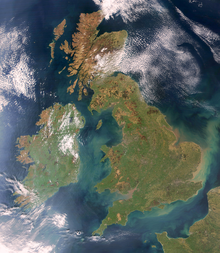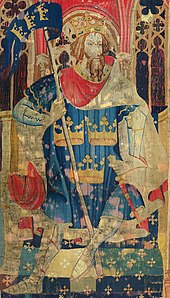| Revision as of 01:04, 5 December 2022 edit50.48.219.152 (talk) →See also← Previous edit | Revision as of 20:13, 21 April 2023 edit undo46.227.53.4 (talk)No edit summaryTags: Mobile edit Mobile web editNext edit → | ||
| Line 4: | Line 4: | ||
| ], in addition to being the flag of the United Kingdom, also serves as a common symbol used by British nationalists]] | ], in addition to being the flag of the United Kingdom, also serves as a common symbol used by British nationalists]] | ||
| ] and ]. Originally British nationalism was applicable to ]. British nationalism typically focuses on the unity of ] and ].{{Citation needed|date=September 2021}}]] | ] and ]. Originally British nationalism was applicable to ]. British nationalism typically focuses on the unity of ] and ].{{Citation needed|date=September 2021}}]] | ||
| '''British nationalism''' asserts that the ] are a ] and promotes the cultural unity of ],{{sfn|Motyl|2001|pp=62-63}}<ref name="Guntram H. Herb 2008">Guntram H. Herb, David H. Kaplan. Nations and Nationalism: A Global Historical Overview: A Global Historical Overview. Santa Barbara, California, USA: ABC-CLIO, 2008.</ref> in a definition of ] that may include people of ], ], ] and ] descent.{{sfn|Motyl|2001|pp=62-64}} British nationalism is closely associated with ], which seeks to uphold the political union that is the ], or strengthen the links between the countries of the United Kingdom.<ref name="Mil133">{{harvnb|Miller|2005|p=133}}.</ref> | '''British nationalism''' asserts that the ] are a ] and promotes the cultural unity of ],{{sfn|Motyl|2001|pp=62-63}}<ref name="Guntram H. Herb 2008">Guntram H. Herb, David H. Kaplan. Nations and Nationalism: A Global Historical Overview: A Global Historical Overview. Santa Barbara, California, USA: ABC-CLIO, 2008.</ref> in a definition of ] that may include people of ], ], ] and ] descent.{{sfn|Motyl|2001|pp=62-64}} British nationalism is closely associated with ], which seeks to uphold the political union that is the ], or strengthen the links between the countries of the United Kingdom.<ref name="Mil133">{{harvnb|Miller|2005|p=133}}.</ref> | ||
| ==History== | ==History== | ||
Revision as of 20:13, 21 April 2023
The assertion and promotion of the British nationNot to be confused with English nationalism, Scottish nationalism, or Welsh nationalism.


British nationalism asserts that the British are a nation and promotes the cultural unity of Britons, in a definition of Britishness that may include people of English, Scottish, Welsh and Northern Irish descent. British nationalism is closely associated with UK or British unionism, which seeks to uphold the political union that is the United Kingdom, or strengthen the links between the countries of the United Kingdom.
History

British nationalism's unifying identity was developed by the ancient Britons who dwelt on the island of Great Britain. British nationalism grew to include people outside Great Britain, in Ireland, because of the 1542 Crown of Ireland Act, which declared that the crown of Ireland was to be held by the ruling monarch of England as well as Anglo-Irish calls for unity with Britain.
Modern
British nationalism is characterised as a "powerful but ambivalent force in British politics". In its moderate form, British nationalism has been a civic nationalism, emphasizing both cohesion and diversity of the people of the United Kingdom, its dependencies, and its former colonies. However, nativist nationalism has arisen based on fear of Britain being swamped by immigrants; this anti-immigrant nativist nationalism has manifested politically in the British National Party (BNP) and other nativist nationalist movements. Politicians, such as former British Prime Minister David Cameron, have sought to promote British nationalism as a progressive cause.
See also
References
Notes
- Motyl 2001, pp. 62–63.
- ^ Guntram H. Herb, David H. Kaplan. Nations and Nationalism: A Global Historical Overview: A Global Historical Overview. Santa Barbara, California, USA: ABC-CLIO, 2008.
- Motyl 2001, pp. 62–64.
- Miller 2005, p. 133.
- Brendan Bradshaw, Peter Roberts. British Consciousness and Identity: The Making of Britain, 1533-1707. P. 302.
- Smith, Smith & White 1988, p. 61.
- ^ Motyl 2001, pp. 64.
- Conservative Party leader David Cameron advocates liberal or civic British nationalism: "Cameron: I will never take Scotland for granted". Conservatives. 15 September 2006. Archived from the original on 24 September 2012.
Being British is one of the most successful examples of inclusive civic nationalism in the world.
The official party site.
Bibliography
- Miller, William Lockley (2005), "Anglo-Scottish Relations from 1900 to Devolution and Beyond", Proceedings of the British Academy, 128, Oxford University Press, ISBN 978-0-19-726331-0
- Motyl, Alexander J. (2001). Encyclopedia of Nationalism, Volume II. Academic Press. ISBN 0-12-227230-7.
- Smith, Michael; Smith, Steve; White, Brian (1988), British foreign policy: tradition, change, and transformation, Routledge, ISBN 978-0-04-327081-3
External links
 Media related to British nationalism at Wikimedia Commons
Media related to British nationalism at Wikimedia Commons- UK National Democrats- A Manifesto for Britain
- British Nationalism: an idea whose time has come- BNP Manifesto 1997
- Rebuilding British Democracy- BNP Manifesto 2005
| Nationalism in the United Kingdom | |||||
|---|---|---|---|---|---|
| British |
| ||||
| Cornish |
| ||||
| English |
| ||||
| Irish |
| ||||
| Scottish |
| ||||
| Ulster |
| ||||
| Welsh |
| ||||